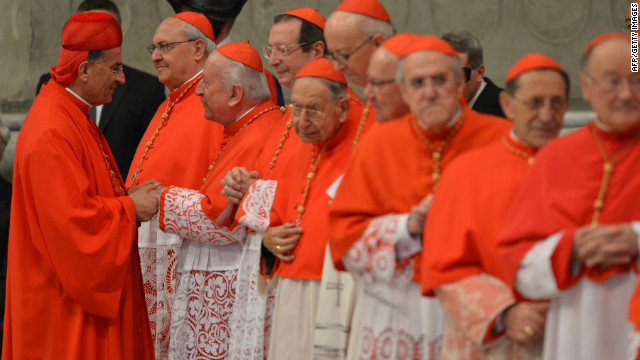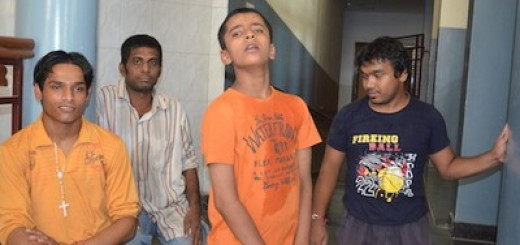Bishops, priests urged to shun extravaganza, clericalism – Isaac Gomes, Kolkata

(Note: Shri. Isaac Gomes from Kolkata writes: The recently concluded (March 9) CBCI Plenary Session at Bangalore has come up with Resolutions which might take the Laity for a pleasant surprise. For never before have all the bishops have been so unanimous on "the crying need for dialogue to solve problems"; to be more "humane"; to be “first and foremost, shepherds of the flock, available and service minded,’’ and to lead a life of “simplicity and spirituality that can be an inspiration to everyone”; "to provide greater opportunities to the Church’s service organizations, comprising health care, education, social services and rehabilitation" and most interestingly "promote transparency and accountability at all levels of administration of the Church — parish and institutions!" CBCI deserves fullsome praise for its courageous statements. We eagerly look forward in bated breath to see how the 178 Bishops present at the plenary session go about their implementation.
This write up was sent to us as a response to our Chief Editor Dr. James Kottoor's post on the subject. Since, the write up is a beautiful summary of what should have happened in the Church, we publish it as a seperate post. joseph mattappally – asso. editor.)
The 2nd March to 9th March biennial plenary of the Catholic Bishops’ Conference of India (CBCI) came out with some very interesting resolutions. They are:
- 1. Unanimous view that the crying need of the hour was dialogue which is essential in solving problems affecting the society and the country. The bishops wanted a more humane and fruitful mode of dealing with the conflicts, not by force, but by an “open, free and trusting dialogue.”
- The right to profess, practise and propagate one’s faith and underlined the fundamental equality of all human beings, regardless of caste, gender, creed and status in life.
- To shun “excessive institutionalization, clericalism and extravaganza” by members and Bishops.
- To be “first and foremost, shepherds of the flock, available and service minded,’’ and to lead a life of “simplicity and spirituality that can be an inspiration to everyone.”
- According to the bishops greater opportunities will be provided to the Church’s service organizations, comprising health care, education, social services and rehabilitation
- To promote transparency and accountability at all levels of administration of the Church — parish and institutions.
DIALOGUE – THE CRYING NEED OF THE HOUR
This realisation by the august assembly of 178 Bishops is really a pleasant surprise! So long they were used to stone-walling all communications from the Aam Aadmi (meek sheep). It has now dawned on them that crying need of the hour is dialogue. True, all over the world all the critical issues are being resolved through dialogue, through “peace brokers.” Even sworn enemies Israel and Palestine have realised that for long-term solution to their differences, dialogue was the better option than bloodshed. Most of the problems which our Bishops sweep under the carpet, can be solved through dialogue, by setting up well-trained Crisis Management Teams in each parish / diocese. One of the important jobs of this team would be to give early warning of “smoldering crises” – ones that ignite a very slow and steady burn. If these are not noticed and addressed at the outset, they might suddenly take the shape of a volcanic eruption and result into uncontrollable catastrophes.
For dialogue, first the church has to free itself from the illusion that it can dictate terms. It has to be “humane” and “trusting” and treat the aggrieved party as equal stakeholder. It has to allow free flow of thoughts including “dissenting opinion”. True dialogue calls for large-heartedness. Bishops, Provincials and Parish Priests can show this by being outgoing and holding regular audience with parishioners and general laity. Though CBCI has a well-publicised Social Communications Commission, in practice bishops and parish priests try not to communicate. The sooner this attitude of suspicion changes, the better.
FUNDAMENTAL EQUALITY OF ALL HUMAN BEINGS, IRRESPECTIVE OF CASTE, GENDER, CREED AND STATUS IN LIFE
The Indian Church itself is guilty of the above discrimination. Though in Christianity (and also in Islam), there is no caste system, in reality it is very much prevalent in the Church, especially in Kerala, Tamil Nadu and Goa. The Indian Church has first to clean up its own house before venturing to advise the Indian Government. The Lord said “You cannot serve two masters.” Similarly Casteism and Christianity cannot go together. Reservation is not the solution.
PROVISION OF GREATER OPPORTUNITIES IN HEALTH CARE, EDUCATION, SOCIAL SERVICES AND REHABILITATION
Though the Indian Christian population is a meagre 2.3% (as per 2011 census) of the total population, the Indian Church holds 25% stake in education and health care services. However, the lion’s share of these services is enjoyed by the non-Christian Community. In most missionary institutions, 90% of student population comprises non-Christians and less than 10% is Christians for whose benefit these institutions were founded and Minority Institution status was obtained. Christian students are given admission no doubt, but in reality they get a cold treatment as a majority of them need fee concession and other hand-holding assistance. Most of the students out of this 10%, drop out in the middle levels, inferiority complex being the main malady. The school authorities do not care to keep track of where they go. To catch the bull by the horn CBCI needs to conduct parish-wise all-India survey to assess developmental activities of a parish and thus arrive at how “service-minded and available” parish priests are.
PROMOTING TRANSPARENCY AND ACCOUNTABILITY AT ALL LEVELS OF ADMINISTRATION OF THE CHURCH — PARISH AND INSTITUTIONS
This is an area where a lot of work can be done provided the intentions are right. For the Indian Church is very allergic to Transparency and Accountability though in Sunday sermons these virtues are profusely praised. Transparency in Sunday Collection, donations received, receipt and disbursement of sponsorship which in most cases are kept under wraps, income and expenses, vendor selection, assets register with details of parish property – is lacking at the Diocesan and Parish levels. Most parishes even today do not have transparently elected Parish Pastoral Councils (PPCs) and Parish Finance Committees (PFCs). PFCs which will capture all income and expenses of a parish and thus help in making parishioners responsible, are non-existent in most parishes. One wonders if CBCI has any authentic database on how many parishes under each diocese have PPCs and PFCs.
Similarly for aid to reach the really needy, parish-wise family database creation is a must. These databases need to be vouched by select members of PPCs and PFCs and updated at pre-determined intervals. They can be customised for data access/ administration/ entry by creating separate passwords. Through an MIS format, the respective parish priests and bishops can get a clear picture of the health of a parish / diocese. From these databases, professionals in various fields can be culled. Professionals form the backbone of any parish / diocese. By treating them with respect, parish priests can motivate them for parish / diocese development activity. Talents can be shared amongst parishes. Professionals too can benefit by finding common meeting grounds to exchange ideas and they (e.g. lawyers, accountants, doctors) will also find a ready clientele.
To translate all the above noble resolutions into reality, a two-pronged approach is a must: (1) Right intention for sustainable development and (2) Scientific approach. There is no place for tokenism.

















